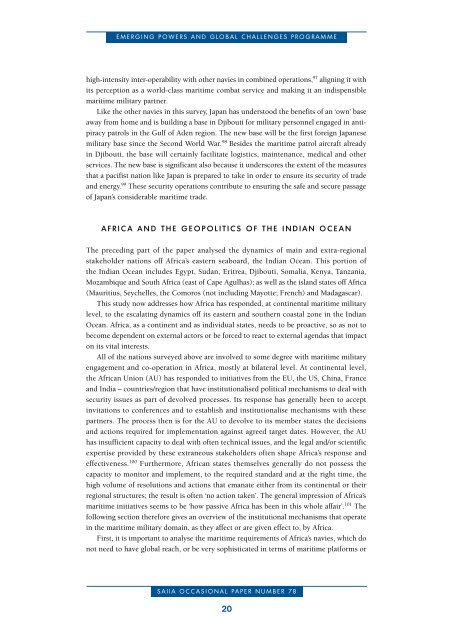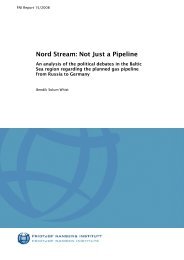Africa and the Geopolitics of the Indian Ocean
Africa and the Geopolitics of the Indian Ocean
Africa and the Geopolitics of the Indian Ocean
You also want an ePaper? Increase the reach of your titles
YUMPU automatically turns print PDFs into web optimized ePapers that Google loves.
EMERgINg POwERS ANd gLOBAL ChALLENgES PROgRAMME<br />
high-intensity inter-operability with o<strong>the</strong>r navies in combined operations, 97 aligning it with<br />
its perception as a world-class maritime combat service <strong>and</strong> making it an indispensible<br />
maritime military partner.<br />
Like <strong>the</strong> o<strong>the</strong>r navies in this survey, Japan has understood <strong>the</strong> benefits <strong>of</strong> an ‘own’ base<br />
away from home <strong>and</strong> is building a base in Djibouti for military personnel engaged in antipiracy<br />
patrols in <strong>the</strong> Gulf <strong>of</strong> Aden region. The new base will be <strong>the</strong> first foreign Japanese<br />
military base since <strong>the</strong> Second World War. 98 Besides <strong>the</strong> maritime patrol aircraft already<br />
in Djibouti, <strong>the</strong> base will certainly facilitate logistics, maintenance, medical <strong>and</strong> o<strong>the</strong>r<br />
services. The new base is significant also because it underscores <strong>the</strong> extent <strong>of</strong> <strong>the</strong> measures<br />
that a pacifist nation like Japan is prepared to take in order to ensure its security <strong>of</strong> trade<br />
<strong>and</strong> energy. 99 These security operations contribute to ensuring <strong>the</strong> safe <strong>and</strong> secure passage<br />
<strong>of</strong> Japan’s considerable maritime trade.<br />
AfRICA ANd thE GEoPolItICS <strong>of</strong> thE INdIAN oCEAN<br />
The preceding part <strong>of</strong> <strong>the</strong> paper analysed <strong>the</strong> dynamics <strong>of</strong> main <strong>and</strong> extra-regional<br />
stakeholder nations <strong>of</strong>f <strong>Africa</strong>’s eastern seaboard, <strong>the</strong> <strong>Indian</strong> <strong>Ocean</strong>. This portion <strong>of</strong><br />
<strong>the</strong> <strong>Indian</strong> <strong>Ocean</strong> includes Egypt, Sudan, Eritrea, Djibouti, Somalia, Kenya, Tanzania,<br />
Mozambique <strong>and</strong> South <strong>Africa</strong> (east <strong>of</strong> Cape Agulhas); as well as <strong>the</strong> isl<strong>and</strong> states <strong>of</strong>f <strong>Africa</strong><br />
(Mauritius, Seychelles, <strong>the</strong> Comoros (not including Mayotte; French) <strong>and</strong> Madagascar).<br />
This study now addresses how <strong>Africa</strong> has responded, at continental maritime military<br />
level, to <strong>the</strong> escalating dynamics <strong>of</strong>f its eastern <strong>and</strong> sou<strong>the</strong>rn coastal zone in <strong>the</strong> <strong>Indian</strong><br />
<strong>Ocean</strong>. <strong>Africa</strong>, as a continent <strong>and</strong> as individual states, needs to be proactive, so as not to<br />
become dependent on external actors or be forced to react to external agendas that impact<br />
on its vital interests.<br />
All <strong>of</strong> <strong>the</strong> nations surveyed above are involved to some degree with maritime military<br />
engagement <strong>and</strong> co-operation in <strong>Africa</strong>, mostly at bilateral level. At continental level,<br />
<strong>the</strong> <strong>Africa</strong>n Union (AU) has responded to initiatives from <strong>the</strong> EU, <strong>the</strong> US, China, France<br />
<strong>and</strong> India – countries/region that have institutionalised political mechanisms to deal with<br />
security issues as part <strong>of</strong> devolved processes. Its response has generally been to accept<br />
invitations to conferences <strong>and</strong> to establish <strong>and</strong> institutionalise mechanisms with <strong>the</strong>se<br />
partners. The process <strong>the</strong>n is for <strong>the</strong> AU to devolve to its member states <strong>the</strong> decisions<br />
<strong>and</strong> actions required for implementation against agreed target dates. However, <strong>the</strong> AU<br />
has insufficient capacity to deal with <strong>of</strong>ten technical issues, <strong>and</strong> <strong>the</strong> legal <strong>and</strong>/or scientific<br />
expertise provided by <strong>the</strong>se extraneous stakeholders <strong>of</strong>ten shape <strong>Africa</strong>’s response <strong>and</strong><br />
effectiveness. 100 Fur<strong>the</strong>rmore, <strong>Africa</strong>n states <strong>the</strong>mselves generally do not possess <strong>the</strong><br />
capacity to monitor <strong>and</strong> implement, to <strong>the</strong> required st<strong>and</strong>ard <strong>and</strong> at <strong>the</strong> right time, <strong>the</strong><br />
high volume <strong>of</strong> resolutions <strong>and</strong> actions that emanate ei<strong>the</strong>r from its continental or <strong>the</strong>ir<br />
regional structures; <strong>the</strong> result is <strong>of</strong>ten ‘no action taken’. The general impression <strong>of</strong> <strong>Africa</strong>’s<br />
maritime initiatives seems to be ‘how passive <strong>Africa</strong> has been in this whole affair’. 101 The<br />
following section <strong>the</strong>refore gives an overview <strong>of</strong> <strong>the</strong> institutional mechanisms that operate<br />
in <strong>the</strong> maritime military domain, as <strong>the</strong>y affect or are given effect to, by <strong>Africa</strong>.<br />
First, it is important to analyse <strong>the</strong> maritime requirements <strong>of</strong> <strong>Africa</strong>’s navies, which do<br />
not need to have global reach, or be very sophisticated in terms <strong>of</strong> maritime platforms or<br />
SAIIA OCCASIONAL PAPER NUMBER 78<br />
20













